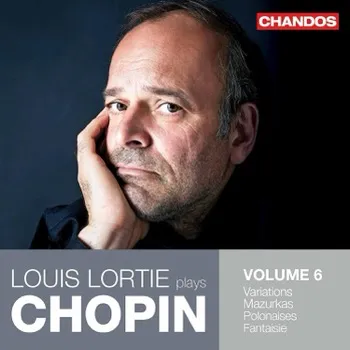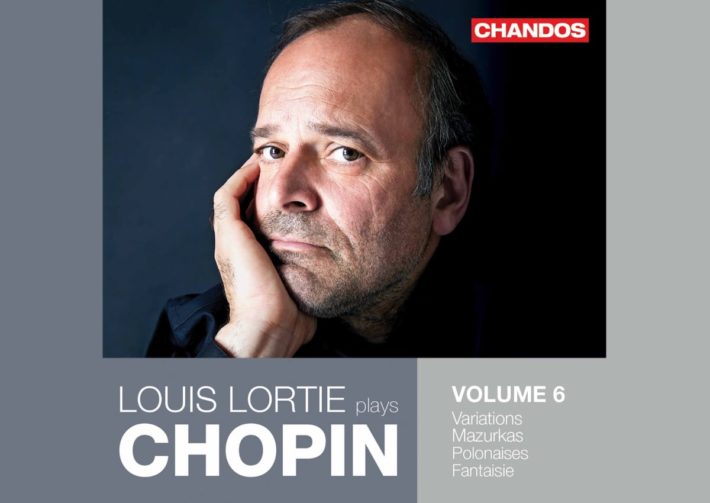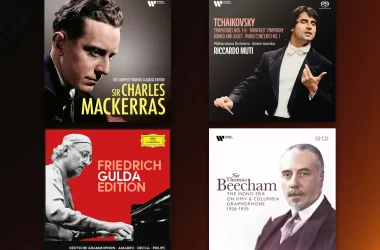This is Louis Lortie’s sixth volume of his ongoing Chopin series, which began in 2010 and promises to include Chopin’s complete works. Rather than offering cycles of works as a whole, each volume includes a diverse recital of opuses from different periods of Chopin’s life. In this latest release, Lortie features a selection of Mazurkas, the La ci darem variations, two polonaises and the Op. 49 Fantaisie.

Chopin was just 17 when he composed the La ci darem variations for piano and orchestra. It was his transcription for solo piano several years later that attracted the attention of Robert Schumann, who hailed the young composer as a genius. This performance is an impressive showing from Lortie, who blends an airy Mozartean texture with Chopin’s sparkling virtuosity. In the first variation (track 11), Lortie tempers a flurry of notes with effortless articulation. He takes care not to ignore the left hand either, using it as a tasteful but distinct rhythmic anchor. The only minor variation (track 15) brings a dynamic element to the work: Lortie smoothly ties together eloquent chordal textures with almost extemporaneous flares of arpeggios; the nocturne-like sections feature melodies to which he imparts the composer’s lovely bel canto quality.
Chopin’s prolific output of Mazurkas and Polonaises symbolizes his lifelong yearning for the music of his homeland. Even beyond the dance rhythms, however, is a sophistication that puts the piano’s most delicate and powerful voices on display. Lortie offers several sets of Mazurkas here, of which I enjoyed Op. 67 for its nuanced approach. The G minor (track 18) shows how Chopin puts many emotional subtleties into such a short work. The C major (track 19) is all about balance: the bounding gaiety contrasts well with a charming inquisitiveness. The only thing wanting here is a more consistent tempo overall that might bring additional sprightliness to the more animated sections. In the A minor Mazurka (track 20), the rubato-rich fluidity works quite well, given the work’s pensive and meandering manner. Lortie has plenty of dynamic gradients and a silky tone quality.
With regards to the Op. 40 Polonaises, Artur Rubinstein once aptly stated that the first from this opus, the “Military” in A major, represents Polish glory while the second C Minor symbolizes Polish tragedy. Lortie captures the heroism and power of the “Military” polonaise well – his accompanimental march-like chords are rich, adding a dignified presence to the interpretation (the resonance of the Fazioli F278 used here is also of great help). However, the performance lacks some of the refinement that standout versions like Pollini’s 1975 DG account have. Pollini is able to change the flow of energy quite effectively in his playing by taking into account the interesting harmonic changes. Listen, for instance, to the first few moments: the escalation from A to C# major carries with it a surge of energy and an increased brightness of tone that captures the work’s excitement. Lortie is a little more uniform in this aspect.
Op. 40 No. 2 fares less well; to me, this Polonaise depicts a dialogue between despair and hope – a development that could have come through much more. The left hand entrance feels too extroverted: seeing how the writing lends an increasing intensity to the gravitas, the opening notes might do better to almost emerge from the depths. To his credit, though, the pianist indeed brings a sensitive and diaphanous element to the lighter major sections.
The F minor Fantaisie (op. 49) is a thoughtful conclusion to the album, given the dance aspect that runs through the Mazurkas and Polonaises. Sections of the Fantaisie indeed contain distant echoes of such themes; the underlying rhythmic patterns in the opening are resemblant of a distant drumbeat. That said, Lortie’s lyricism, while beautiful, comes at the expense of a crisper articulation, especially in the left hand and the dotted rhythms which tend to drag (1:20-1:36). One might look to Rubinstein’s early 1960s recording for a good rapport between pacing and a welcome introspectiveness.
Although some selections are better represented than others, this is a solid recording. The liner notes also provide helpful background information for each work. Those who wish for the comprehensive Chopin listening experience might want to explore other established interpreters as well, but in Lortie’s continued journey through the composer’s works, his sincerity and dedication are never in doubt.
Recommended Comparisons
Rubinstein | Pollini | Rubinstein | Trifonov
“Louis Lortie Plays Chopin”, Volume 6
Louis Lortie – Piano
Chandos Records, CD CHAN20117




















